The joyful marriage of cutting-edge neuroscience and ancestral awareness.
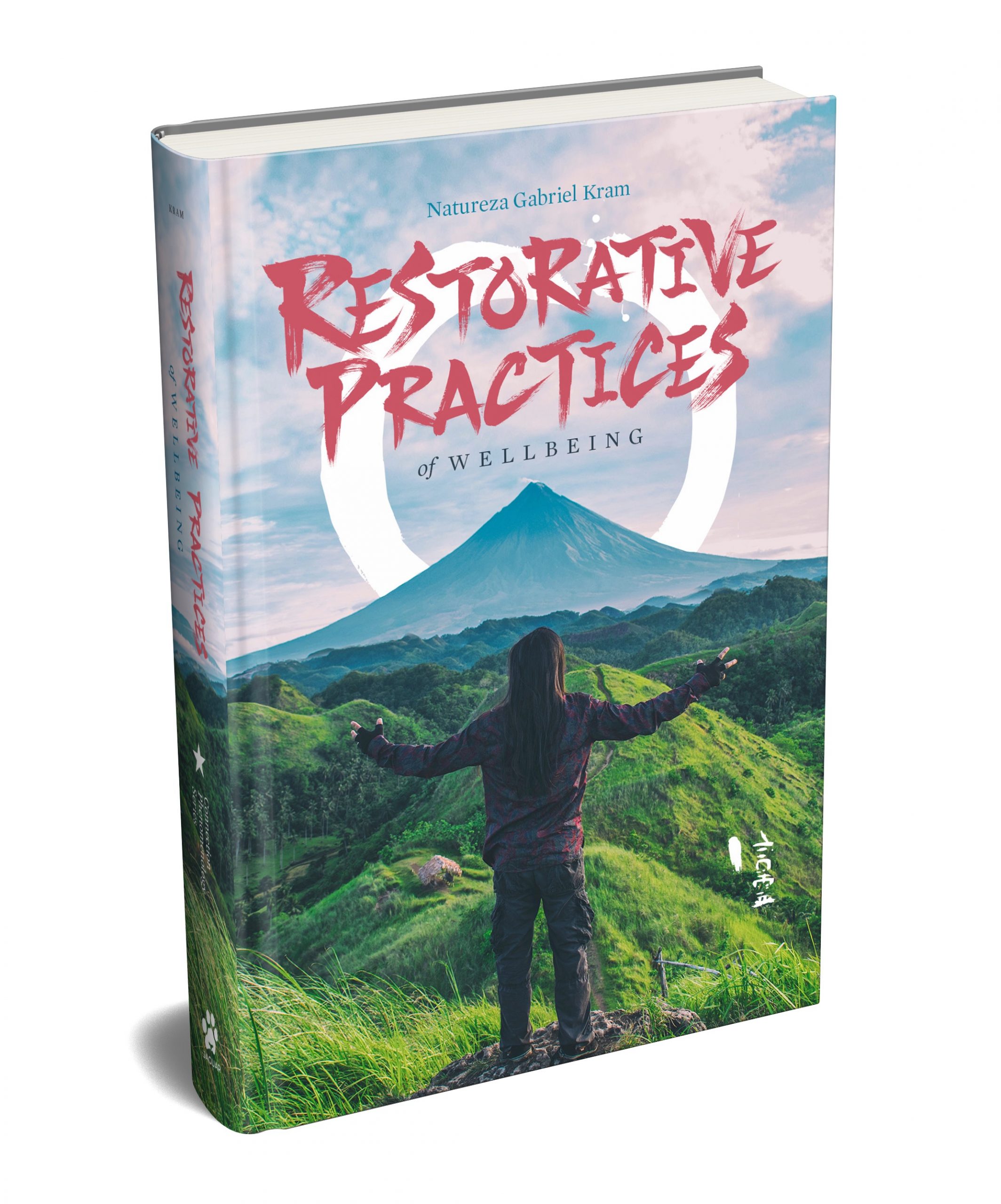
This is the ancestral future of wellbeing
A masterpiece. -Dr. Jeff Rockwell
More than 300 practices of connection in support of healthy Self, healthy Tribe, and Healthy Planet.
Restorative Practices of Wellbeing is a remarkable book...–Dr. Stephen Porges, PhD, Developer of the Polyvagal Theory
A practical, neuroscience-informed guidebook to activating and sustaining the root drivers of wellbeing in uncertain times.
“I long, as does every human being, to be at home wherever I find myself.” Maya Angelou
For anyone who has faced a difficult childhood or a difficult pandemic, grown up with a sense that there is something missing in the modern world, or yearns for deeper connection with self, others, or the living world, Restorative Practices of Wellbeing provides a (r)evolutionary approach to wellbeing so ancient it hasn't been invented yet.
Connection is the fountain of wellbeing, yet the modern world is increasingly dissociated and disconnected. From the skyrocketing use of social media, to not being able to see one another’s facial expressions behind masks, it seems our world is accelerating away from connection. At a physiological level, this is a movement away from ourselves and from the root drivers of wellbeing required to sustain joy and resilience at an embodied level. This movement away from connection is driving a mass degradation of mental and emotional health globally.
Thankfully, traditional and ancestral cultures around the world have developed and deployed neuro-technologies of connection since the dawn of time. Restorative Practices of Wellbeing offers 300+ approaches for connection with Self, Others, and the Living World. Learn how to
•Assess and down-shift threat responses
•Feed your connection system and weave mindfulness into daily life
•Fine-tune your senses and become more embodied
•Develop non-cognitive ways of knowing
•Build healthier relationships and relate across difference
•Connect deeply with Nature, open to creativity, and use language restoratively
A long-practicing connection phenomenologist mentored by more than 50 advisors in 25 disciplines of wellbeing from more than 20 cultures, Kram’s lifework is the study and practice of connection and the removal of what gets in the way. He has examined his subject through the lenses of neuroscience, mindful awareness, creativity, social justice, cultural linguistics, deep nature awareness, and non-cognitive ways of knowing. Warm and insightful, his remarkable knowledge base and deep passion for planetary flourishing make him a remarkably useful guide to turning on your own connection system.
With practice, you can be at home wherever you find yourself. Restorative Practices of Wellbeing is a perfect companion for your journey.
Natureza Gabriel Kram is the Founder and CEO of Applied Mindfulness, Inc., the Co-Convener of the Restorative Practices Alliance, and the Co-Founder of the Academy of Applied Social Medicine. He studied at Yale and Stanford Universities, but has been shaped more by sitting in teepees and circles than in classrooms. He lives with his family on Miwok territory in Northern California.
Restorative Practices of Wellbeing is a remarkable book. The author, Natureza Gabriel Kram, provides a compelling narrative of his personal journey of restoration in which he shares his path from vulnerability and illness to resilience and benevolence. His personal transformation has led him into a deeper understanding of the elements necessary for human thriving that honors the human capacity to compassionately connect with others. Along this journey he identified practices of restoration that humanity has employed for millennia. He shares his knowledge and access to these practices, which are now gaining additional traction as they are being explained by contemporary neuroscience. The book functions not only as a personal example of restoration, but as an innovative learning platform beautifully illustrated in which the text is integrated with an app that directs the reader to online details of restorative practices representing diverse disciplines and cultures. The book invites the reader to join a journey well worth the experience! –Dr. Stephen Porges, PhD, Developer of the Polyvagal Theory
“Restorative Practices is an excellent guide to wellbeing and wholeness that is greatly needed today. The author has exercised discipline, love, and awareness that we Indigenous peoples call qualities of the "Real Human Being". I encourage people of all walks of life to read this book.” –Ilarion Merculieff, President, Global Center for Indigenous Leadership & Lifeways
I am a restorative hatha yoga teacher in Calgary. My bookshelf is packed with delicious books on topic surrounding the nervous system, trauma and healing. This book of yours is BY FAR my favorite book EVER !!!! My neck gets tired reading it, at times, because I am nodding away with every single sentence. You have enhanced our lives through this work and I cannot thank you enough. –Michelle Crawford
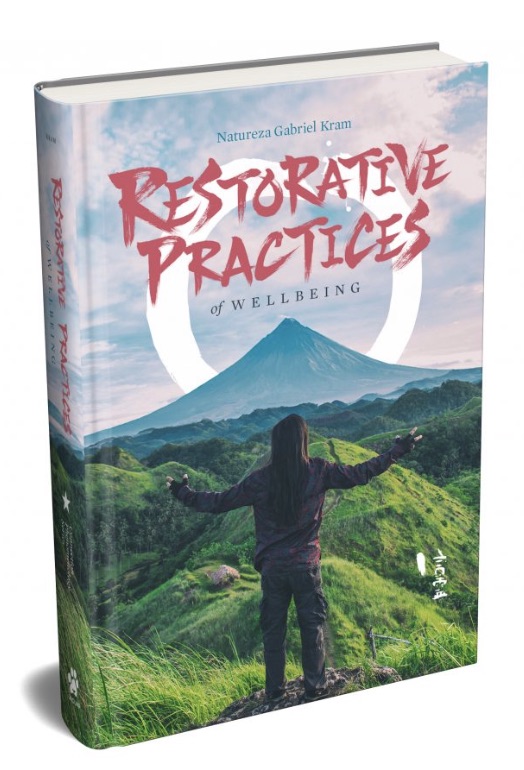
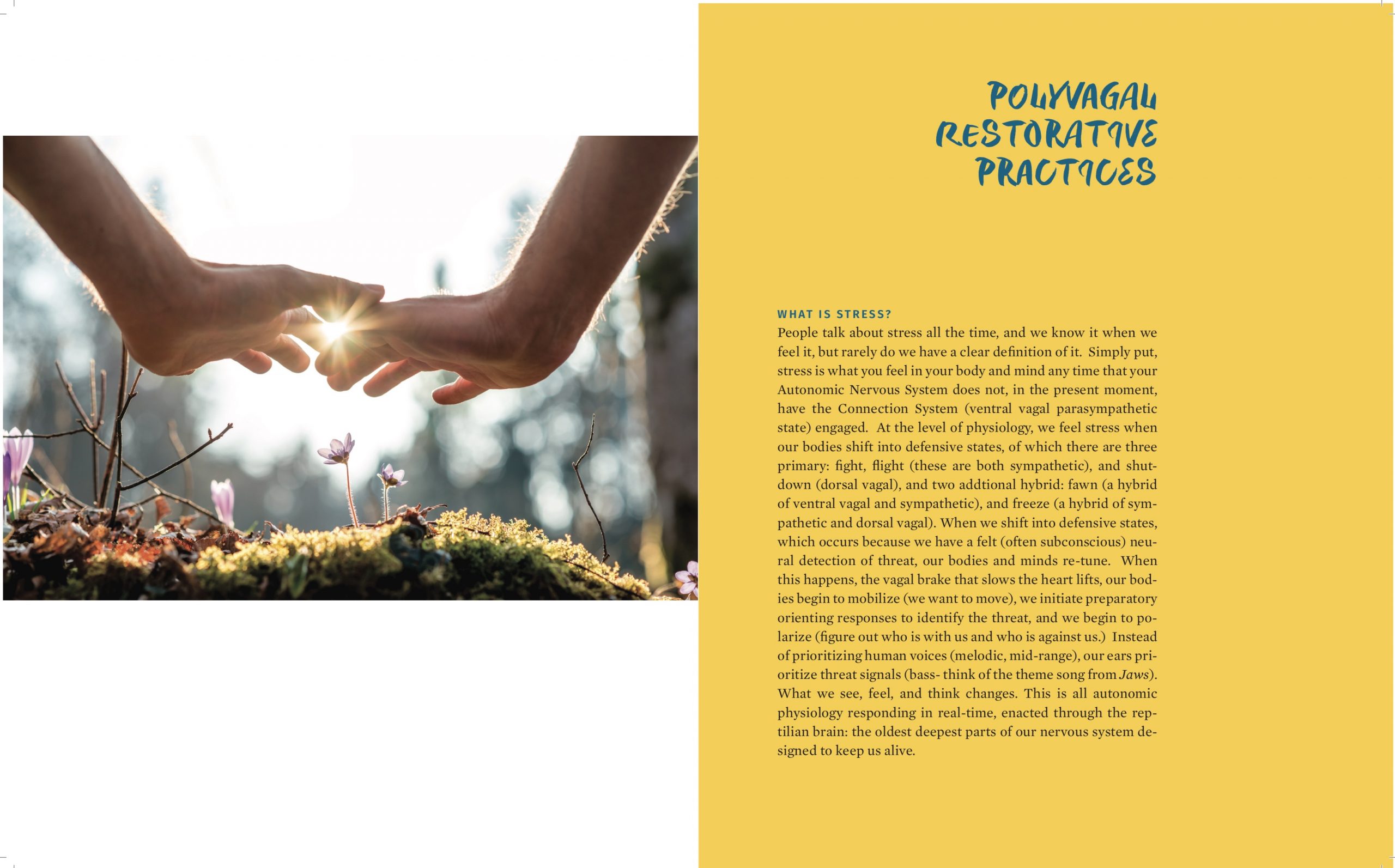
Because why shouldn't the app to an ancestral neuro-technology platform be a beautiful book?
What is an analog app, you ask? One of the fundamental questions for us, as an ancestral neuro-technology cooperative, is what exactly do we mean by technology? In our estimation, there is more technology in a humble blade of grass than in the most advanced technology companies in the world. There are certain things about the internet we love–when else in human history has the world has such profound access to transformative learning tools? There are certain things about the internet we do not love: the neuro-developmental harms of social media, algorithmic bias, or the degree to which screens, and digital technology in general is unplugging people from direct contact with their sensory environments.
We also love books, in all their tactile dimensions. We decided therefore to create the app for this website as a book. What that means, practically, is that the book illustrates and describes about 300 restorative practices of wellbeing. Should you be interested in learning a particular practice, if you have a membership on the learning platform, you can point your phone at the code that accompanies each practice (it is called a QR code- see the circle at bottom right in the illustration below), and it will take you directly to the video for that practice on our learning platform. This places you in analog sensory relationship to our work through the book, with access to our videos and assessment tools should you need them. That's what we mean by an analog app.
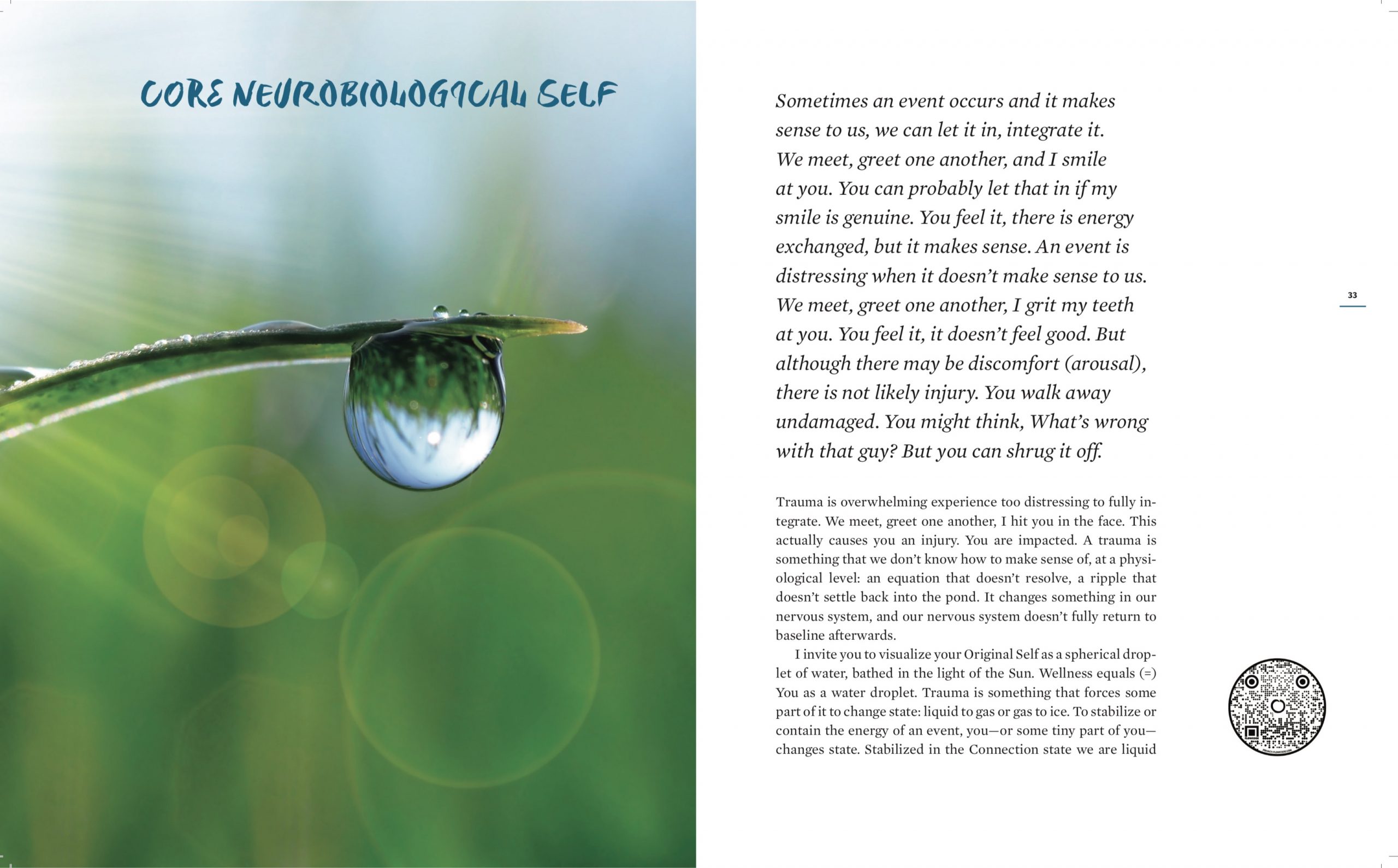
- 7 x 9 inches
- 410 pages
- 300 practices
- 150 full color illustrations
- the analog app to the Restorative Practices Learning Platform
- Designed by Kevin Barrett Kane, Principal Book Designer of Stanford University Press
The joyful marriage of Polyvagal Theory and Ancestral Awareness
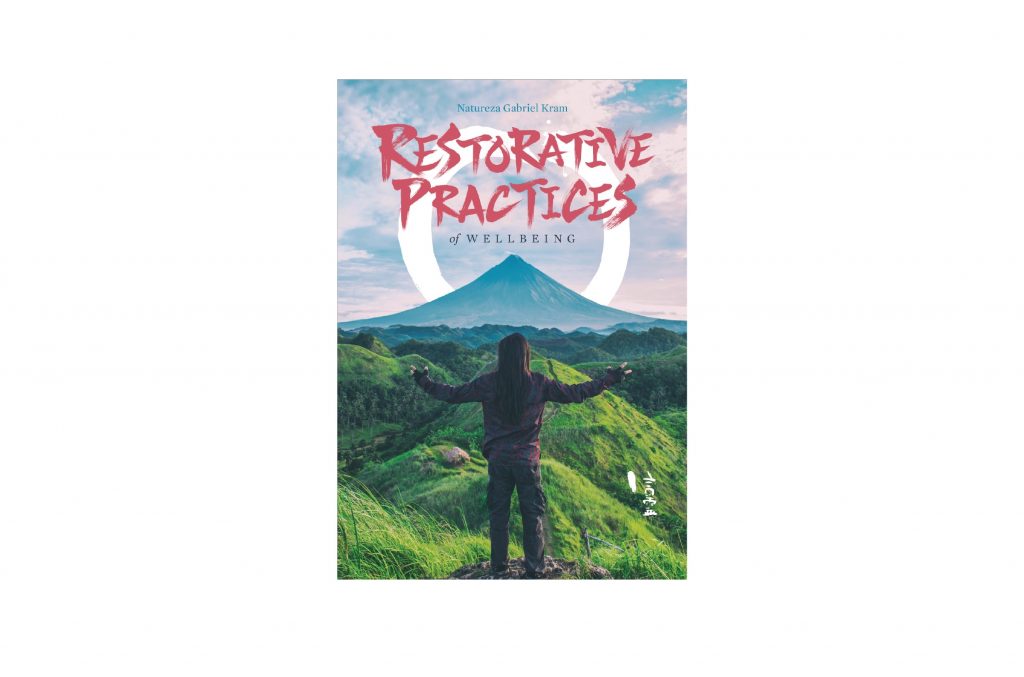
“I long, as does every human being, to be at home wherever I find myself.” Maya Angelou
For anyone who has faced a difficult childhood or a difficult pandemic, grown up with a sense that there is something missing in the modern world, or yearns for deeper connection with self, others, or the living world, Restorative Practices of Wellbeing provides a (r)evolutionary approach to wellbeing so ancient it hasn't been invented yet.
Connection is the fountain of wellbeing, yet the modern world is increasingly dissociated and disconnected. From the skyrocketing use of social media, to not being able to see one another’s facial expressions behind masks, it seems our world is accelerating away from connection. At a physiological level, this is a movement away from ourselves and from the root drivers of wellbeing required to sustain joy and resilience at an embodied level. This movement away from connection is driving a mass degradation of mental and emotional health globally.
Thankfully, traditional and ancestral cultures around the world have developed and deployed neuro-technologies of connection since the dawn of time. Restorative Practices of Wellbeing offers 300+ approaches for connection with Self, Others, and the Living World. Learn how to
•Assess and down-shift threat responses
•Feed your connection system and weave mindfulness into daily life
•Fine-tune your senses and become more embodied
•Develop non-cognitive ways of knowing
•Build healthier relationships and relate across difference
•Connect deeply with Nature, open to creativity, and use language restoratively
A long-practicing connection phenomenologist mentored by more than 50 advisors in 25 disciplines of wellbeing from more than 20 cultures, Kram’s lifework is the study and practice of connection and the removal of what gets in the way. He has examined his subject through the lenses of neuroscience, mindful awareness, creativity, social justice, cultural linguistics, deep nature awareness, and non-cognitive ways of knowing. Warm and insightful, his remarkable knowledge base and deep passion for planetary flourishing make him a remarkably useful guide to turning on your own connection system.
With practice, you can be at home wherever you find yourself. Restorative Practices of Wellbeing is a perfect companion for your journey.
Natureza Gabriel Kram is the Founder and CEO of Applied Mindfulness, Inc., the Co-Convener of the Restorative Practices Alliance, and the Co-Founder of the Academy of Applied Social Medicine. He studied at Yale and Stanford Universities, but has been shaped more by sitting in teepees and circles than in classrooms. He lives with his family on Miwok territory in Northern California.
Restorative Practices of Wellbeing is a remarkable book. The author, Natureza Gabriel Kram, provides a compelling narrative of his personal journey of restoration in which he shares his path from vulnerability and illness to resilience and benevolence. His personal transformation has led him into a deeper understanding of the elements necessary for human thriving that honors the human capacity to compassionately connect with others. Along this journey he identified practices of restoration that humanity has employed for millennia. He shares his knowledge and access to these practices, which are now gaining additional traction as they are being explained by contemporary neuroscience. The book functions not only as a personal example of restoration, but as an innovative learning platform beautifully illustrated in which the text is integrated with an app that directs the reader to online details of restorative practices representing diverse disciplines and cultures. The book invites the reader to join a journey well worth the experience! –Dr. Stephen Porges, PhD, Developer of the Polyvagal Theory
“Restorative Practices is an excellent guide to wellbeing and wholeness that is greatly needed today. The author has exercised discipline, love, and awareness that we Indigenous peoples call qualities of the "Real Human Being". I encourage people of all walks of life to read this book.” –Ilarion Merculieff, President, Global Center for Indigenous Leadership & Lifeways
I am a restorative hatha yoga teacher in Calgary. My bookshelf is packed with delicious books on topic surrounding the nervous system, trauma and healing. This book of yours is BY FAR my favorite book EVER !!!! My neck gets tired reading it, at times, because I am nodding away with every single sentence. You have enhanced our lives through this work and I cannot thank you enough. –Michelle Crawford
Because why shouldn't the app to an ancestral neuro-technology platform be a beautiful book?
What is an analog app, you ask? One of the fundamental questions for us, as an ancestral neuro-technology cooperative, is what exactly do we mean by technology? In our estimation, there is more technology in a humble blade of grass than in the most advanced technology companies in the world. There are certain things about the internet we love–when else in human history has the world has such profound access to transformative learning tools? There are certain things about the internet we do not love: the neuro-developmental harms of social media, algorithmic bias, or the degree to which screens, and digital technology in general is unplugging people from direct contact with their sensory environments.
We also love books, in all their tactile dimensions. We decided therefore to create the app for this website as a book. What that means, practically, is that the book illustrates and describes about 300 restorative practices of wellbeing. Should you be interested in learning a particular practice, if you have a membership on the learning platform, you can point your phone at the code that accompanies each practice, and it will take you directly to the video for that practice on our website. This places you in analog sensory relationship to our work through the book, with access to our videos and assessment tools should you need them. That's what we mean by an analog app.
- 7 x 9 inches
- 410 pages
- 300 practices
- 150 full color illustrations
- the analog app to the Restorative Practices Learning Platform
- Designed by Kevin Barrett Kane, Principal Book Designer of Stanford University Press

